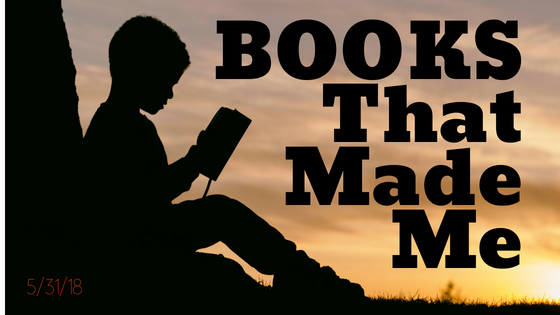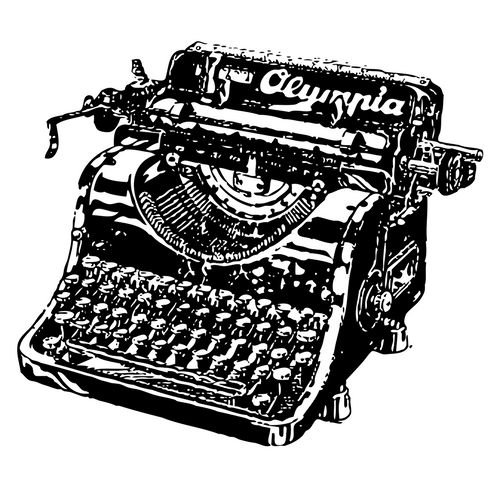|
According to my mother, who I view as an authoritative (and trustworthy) source on most subjects, I began reading books very early. At least, I tried to. While still a toddler, I would apparently sit for long stretches of time with a book held open in my lap, turning the pages at regular intervals, all the while staring very seriously at the words as though attempting to work out what all this was about. I am sure many of you did this, too. Imitation, they say, is the sincerest form of flattery. As children, we imitate the behavior of adults. To flatter them. After all, adults are the ones who know where the cookies are. And as children, we are all about earning those treats. At least, I was. Also, I just liked the way books smelled. I still do. Paper! And ink! And...something else. Glue? Magic? Hard to say. My parents eventually took pity on me and taught me to read. As far as I can remember, this happened before I started school. Some of my earliest clear memories are sitting on my mom’s lap, working our way through a home phonetics book. Later, in school, I was fortunate enough to have great elementary teachers who fostered my early love of reading. My first grade teacher ran something called the Idita-Read. This was a reading competition based on the famous Iditarod dog sled race. There was a large map of Alaska on the classroom wall, and we were all assigned a little laminated illustration of a dog sled with a number attached. For every night we read a chapter in a book, our illustration would be moved another space. Medals were awarded to those students who got all the way from Anchorage to Nome. We all probably got medals, but in my memory, only three of us did. In my mind, there was a third place, second place, and a third place medal. And I was one of the three. Because I loved to read! This week, I thought I might share a list of books I loved when I was younger. If you have a young person in your life, I highly recommend these books. They are great. Many are famous. Several have won awards. I have, incidentally, re-read all of these as an adult. They hold up. Most of them have even improved with age, as all truly great things do. Next week, I will share a list of books I currently recommend to all. Books more targeted to adults. But for now, let us cast our minds back to simpler times. THE HOBBITAssuming anyone kept track of the old file card records at Brookston Prairie Township Library in Brookston, Indiana, my future biographers may (cough, cough - possibly) note that I set a record as having checked out The Hobbit by J.R.R. Tolkien more times than any other elementary schooler ever. I am sure I must have, though memory, as we have already established, is a wibbly-wobbly, timey-wimey thing. I can still picture the cover of the 30th anniversary edition that the library had hidden on a musty shelf up on the second floor. It was oversized hardcover copy, well-worn, and emblazoned with a big, celebratory “30” in shimmery green and yellow printing, as grand and as glinting as the scales of the great dragon Smaug. Even if you are intimidated by or (what is more likely) put off by the worshipful nerd herd that surrounds the works of J.R.R. Tolkien, I would still recommend The Hobbit. It is a much more accessible book than his masterwork, The Lord of the Rings. It is a straightforward tale of adventure. It has a clear beginning, middle, and end. Detractors would say it is a slighter work, a proto-story, an ocean-going amoeba later overshadowed by a much-loved leviathan. But I disagree. It captured my attention first, and I love it dearly. The Lord of the Rings, while admittedly masterful, is rambling and frequently strays from the main thread of the plot, however worthy and profound that plot may be. Let us just say that the book The Hobbit is to the books The Lord of the Rings as the movie versions of The Lord of the Rings are to the movie versions of The Hobbit -- at least to me. I am not saying that is a flawless comparison, but I know which I would rather revisit. (You may fight me in the comments, fellow nerds.) CHARLIE AND THE CHOCOLATE FACTORYAnother book that I re-read often in elementary school was Charlie and the Chocolate Factory, the famous book by Roald Dahl on which the later movie versions were based. I am still a huge fan of the man’s work. Matilda, James and the Giant Peach, and The BFG were also fast favorites, but I constantly returned to the tale of Willy Wonka and his wondrous chocolate factory. Perhaps tales of contests and the inevitable triumph of noble young children are irresistable when one is a young and (aspiringly) noble child. Perhaps the mad humor and eccentricity just struck a chord with young Philip, the future theatre/comedy nerd. It is a difficult knot to untangle. All I know is, I loved the book. And I still do. LITTLE HOUSE IN THE BIG WOODSThis admission is more embarrassing. The Little House on the Prairie series is not typically seen as a series for young boys, but I was lucky enough to have a teacher in third grade who took time each day to read to her class from the first book in this series, Little House in the Big Woods. My young mind was utterly captivated by this charming, straightforward account of everyday life for a family living in pioneer times, which is based on the actual life experiences of the author, Laura Ingalls Wilder. I really cannot recommend the series highly enough. The whole thing is wonderfully well written, and it is all shot through with an experiential authenticity that can be imitated but not duplicated by other “historical fiction” works for children. I am certain it helped to instill in me an appreciation for and a curiosity about what life was like for other people in different times and places. Farmer Boy, the story of Laura’s husband’s childhood back East, is also one I would recommend. And yes, the rumors are true. In fifth grade, I used to sneak a copy of The Happy Golden Years, the story of Laura and her husband Almanzo’s courtship, out of the Frontier Elementary School Library. And by that I mean, I checked the book out properly, because I was (an aspiringly) noble child, but I hid the book under other books when I snuck it up to the check out desk, for fear any other student might spy the cover. It showed a chaste picture of Laura and Almanzo under a tree…holding hands. The shame! Even as a fifth grader, I had to consider my manly reputation. THE WESTING GAMEThis book, by Ellen Raskin, won the Newbery Award in 1978, and if you haven’t read it, I really don’t want to tell you too much about it, because I don’t want to spoil the delicious twists and turns of its tightly coiled plot. It concerns the death of a famous business owner and the strange conditions of his will. It winds together the tales of his inheritors. It is amazing. I read it again a few years back as an adult, and I still cried at the end. Granted, I cry at lots of things, but it is a beautiful story. It is a murder mystery. And a game. And a great book. THE LONG PATROLThis is a book in the Redwall series by Brian Jacques, and, having read almost all of them, I am not sure if it is the best book to start with if you haven’t ever tried the series. They are...specific books. They involve forest animals who walk the world as warriors in distinct tribes based on kind. There are mice who are noble monks. Some are warriors. There are tribes of river otters and marauding bands of evil rats and other wicked rodents. This particular book tells the story of a young hare who runs away from home to join an elite force of hares - the titular Long Patrol - that guard an ancient stronghold under the watchful eye of a Badger Lord. Together they protect the coastline from piratical rats. If that sounds like nonsense to you, I understand. But it is also magnificent fantasy, and it is a kind-hearted, old school series that values old school virtues like honesty and bravery and is not as silly as it sounds once you sink down into the mice-ridden mire. The Long Patrol is simply my favorite book in the series, but I recommend the whole thing in its (absurdly) glorious, and weirdly unironic, entirety. HARRY POTTER AND THE PRISONER OF AZKABANThis whole series is so well-known that I will not waste many words in singing its praises. No doubt you have heard this tune already. But this, the third book, is my personal favorite. I actually read this book first, skipping over the previous two. My parents, in case you didn’t know, were Protestant missionaries, and they had been told, by friends, that these books were about witches. Therefore, my siblings and I were told we not allowed to read them. Naturally, this made me want to read them. Many of the early Harry Potter books begin with Harry sitting up in bed, reading a spellbook at night by the light of a flashlight, so imagine my delight as I lay in bed late one night, reading by the glimmer of a similarly secret light. My parents eventually waived the silly rule, having realized that the stories contained nothing untoward, but the books remain a (minor) guilty pleasure. Like pretty much everyone, I love this series. I am sure you do, too. THE PHANTOM TOLLBOOTHThis book, published in 1961 by Norton Juster, is a complete and utter classic. It tells the tale of a bored young boy named Milo who travels into the mysterious Kingdom of Wisdom, accompanied by a watchdog named Tock. It is ridiculous, witty, and full of warmth and wordplay. Too many things happen in it that I would never wish to ruin for you. If you have never read it, read it. No matter how old you are. THE THIRTEEN CLOCKSEven as I compile this list, more books spring unbidden into my mind. I am a lover of books, and like many of you, I am more than capable of prattling on and on in the praise of both this and that and that other thing.
So let me dock this metaphorical ship in the safe harbor that is possibly the greatest of all books written with children in mind. The Thirteen Clocks was published in 1950 by James Thurber. It is the fantastic tale of a quest. A prince rescues a princess from the clutches of an evil duke. I have just told you the plot, but I have told you nothing at all, because the magic of this book lies in its words. Towards the end of his life, James Thurber started to go blind. A lifelong writer, he nevertheless continued to write, compulsively perfecting his books in his head before dictating them out to a secretary. Because of this, he grew obsessed with the way words sounded together, crafting sentences that danced with a perfection of cadence rarely countenanced by either the eye or the ear. Do yourself a favor. Read The Thirteen Clocks. Read it aloud. See you next week.
0 Comments
Leave a Reply. |
AuthorPhilip David Black is an actor, educator, voice over artist, and blog author. Someday he may write books. Until then, he blogs . Archives
June 2018
Categories |


 RSS Feed
RSS Feed